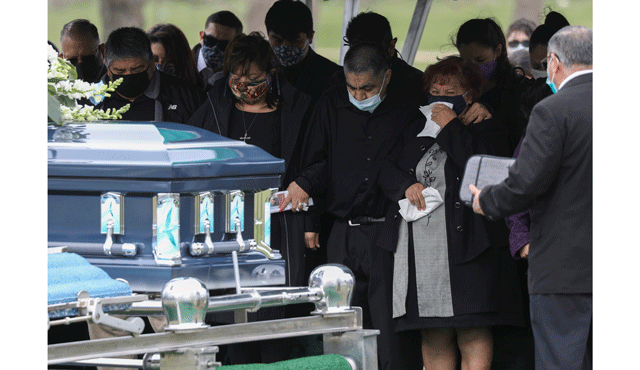Grief support teams and bereavement ministers meet Catholic families’ critical needs every day, but their work is taking on new meaning and importance in the COVID-19 crisis.
“It seems the whole world is grieving right now,” observes Lisa J. Nollette, director of adult faith formation at Our Lady Queen of Angels Church in Newport Beach. “Everyone is experiencing some kind of loss right now, and our grief rears its ugly face when we least expect it.”
Nollette, who also serves as a chaplain at Hoag Hospital, says losing a loved one is complicated. “Grief is mysterious,” she explains. “A song, a line from a book, a smell – any of these can take you right back into that place of loss.”
Throughout the Diocese of Orange, parishes offer grieving families support in planning for rosary, funeral, and graveside services, as well as referring them to support groups, hospice organizations, mortuaries, and mental-health counselors.
“When family members call our parish office, they arrange the funeral time and date and then contact me,” says Mayrose Forbes, who heads the bereavement team at Holy Spirit Church in Fountain Valley. “We meet with the family to review the process, help them select songs and gospel readings, and review the diocesan dos and don’ts for the services.”
Before the coronavirus pandemic team and family members met in person. Now the meetings are either held virtually or via phone.
The coronavirus pandemic has complicated the grieving process, acknowledges Becky Lomaka, director of grief support and education for St. John Neumann Church in Irvine.
“Even if a person hasn’t died of COVID, people have been isolated,” says Lomaka, who also serves as director of grief support and education for O’Connor Mortuary in Laguna Hills. Parishes offer much-needed community support for grieving families, she says, pointing to diocesan events and partnerships with mortuaries, hospitals, and other resources.
“The thing I’ve heard time and again is that when people are grieving a loss, there are moments of joy in their lives as well,” she says. “We let people know that it’s OK for them to experience moments of happiness.”
While the bereavement team’s main purpose is to ensure that services adhere to Catholic doctrine and tradition, Forbes explains, its most important duty is listening. “We try to take as much of the burden of planning from them as possible.”
Bereavement teams and grief support groups, as well as hospice and hospital support organizations, are helpful to those who need help identifying what grief looks like, how to process it, and offering a safe place to experience it, says Jeff Frum, senior vice president of sales and marketing for Irvine-based Silverado Hospice.
When his mother died recently, he became a client in addition to an employee. “They got to know me and my family and not only offered support through our faith community but would have connected us with one if we didn’t have it,” Frum recalls. “It was helpful to process my feelings with someone who understands grief. Knowing they were there, that they cared, reminded me that I wasn’t alone, and that grief is a process.”
Even Catholics who are not practicing find comfort in the ancient rituals of rosary, funeral, and gravesite services, Nollette says. That comfort is especially critical during the COVID-19 pandemic. “It’s been a tough time to say goodbye, because a lot of times people are dying in hospitals or care facilities where their families aren’t allowed, so they can’t say goodbye,” she says.
In addition to the well-documented stages of grief recognized by the mental health community, many of us experience what Nollette calls ‘anticipatory grief’ as we sit with a dying loved one.
“People grieve before they grieve,” she notes. “The person is not gone but they are still experiencing loss.”
With coronavirus, the grieving process is complicated, agrees Linda Gigliotti, an Irvine therapist who serves as diocesan health and wellness consultant.
“During this time of pandemic we aren’t supposed to be together, so we are alone,” Gigliotti notes. “Someone’s passing makes us feel even more alone. People are more prone to depression and loneliness.”
GriefShare, a nationwide organization, offers workbooks, videos, and other materials used in 13-week cycles, says Jennifer Dagarag, who runs the group based at St. Irenaeus Church.
“We provide a safe environment for people to grieve,” says Dagarag, who serves as community nurse at the Cypress parish. “We tell them ‘it’s OK to not be OK.’ We provide a safe environment to share whatever they need to share, whenever they are ready.”
Bereavement and grief resources: Visit www.olqa.org/today for daily reflections. Visit littlerockscripture.org to order the Alive in the Word books that provide a guide through the grieving process. Visit stephenministries.org to order the four Journeying Through Grief books. Providence.org has a list of hospice and grief support services, as does psjhmedgroups.org.

